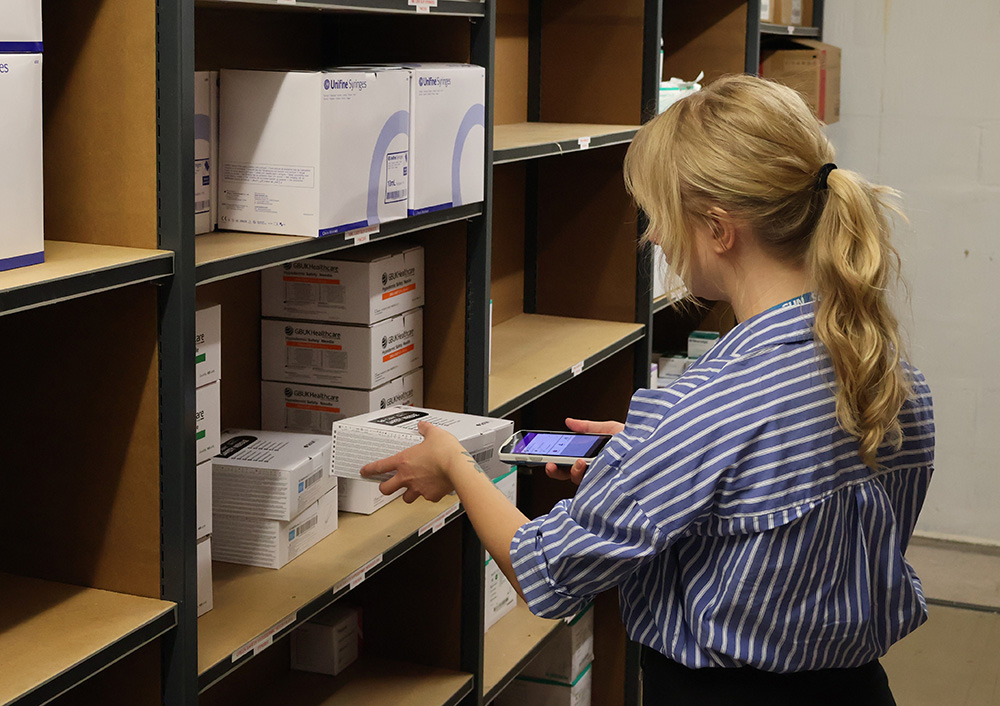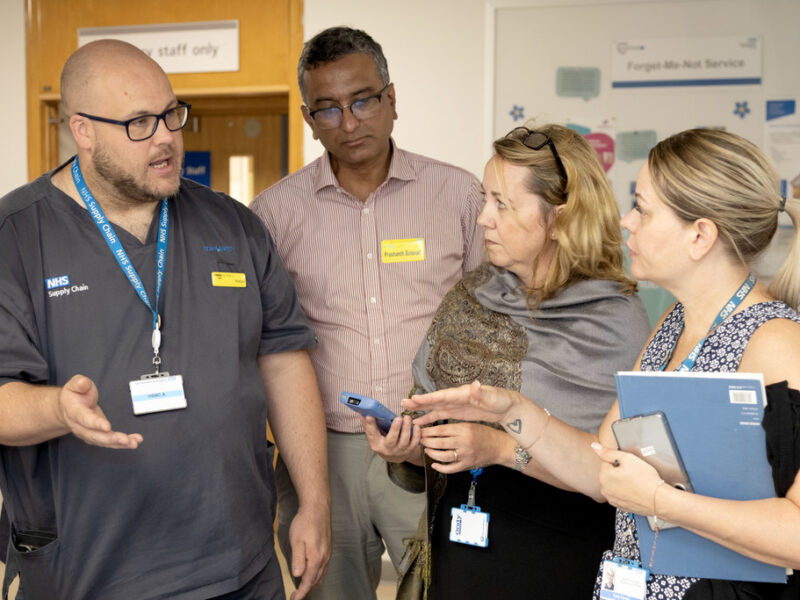Where we are
The first phase of our IMS partnership with NHS trusts has seen 19 trusts go live across 83 locations (with this number still growing). Key benefits include reducing stock wastage, obsolescence and overstock alongside improvements in patient safety, working efficiencies and service quality.
Initial savings of over £6.7 million have been recorded since the start of the programme (to November 2025), alongside other benefits that support our aims of improving quality, safety, effectiveness and experience across the NHS:
- 700 hours clinical time saved per trust so far (November 2025).
- One trust reported a reduction from several cancelled operations per month (due to lack of stock) to just one operation cancelled in seven months.
- Another trust reported being able to return a full-time nurse back to clinical duties, who previously was administrating stock.
December 2025 Update
We have seen key benefits around reduction in waste and obsolescence; reduction in clinical time spent on administrative tasks, and sustainability – Northumbria NHS Trust has reported a 729-tonne carbon reduction within six months – nearly 1% of its annual procurement-related footprint.
In the last 12 months we have captured £6.8 million across wastage, reduced overstock, obsolescence and rationalisation. The programme is now live in 19 NHS Trusts, across 83 locations, spanning 12 clinical specialities, and over 30 theatres and labs. On average, 700 clinical hours per year have been saved per trust, freeing up time for patient care, and an average saving per trust of £2.7 million over 5 years.
We are enabling trusts to submit timely, accurate data feeds, to the legally mandated medical devices outcomes registries programme (MDOR) at NHS England. In addition, trusts are able to ensure corrective actions for product recalls take minutes rather than days.
We are currently developing a package of resources for trusts including videos, lessons learnt and how to be ready. This will be shared via our website, when available.
See our Downloads ▼ section for the update in full.
What’s next?
After successfully delivering our pilot programme, we are now working on our processes and procedures to support those trusts without an inventory management system in place.
Our aim is to support all trusts on their journey to managing their inventory to a high standard over the next five years, building on our learning from the pilot.
For trusts not yet using an IMS, we encourage you to begin pre-implementation activities in preparation for future participation in the programme.
Ready to explore IMS in your trust?
Following further investment from NHS England we’re happy to be able to continue supporting all trusts on their individual IMS journeys. To take the next step please contact us today:
In-Trust Inventory Management Systems (IMS) Team
Introduction to IMS
The NHS is evolving to improve productivity, use technology, and integrate care, which is crucial for enhancing patient outcomes and system efficiencies.
Unlocking savings, improving patient care, and creating greater supply chain resilience has always been at the heart of our offering to the NHS and we have a goal to deliver £1 billion of recurrent savings by 2030.
As part of a national programme managed by NHS Supply Chain, advanced solutions for Inventory Management Systems (IMS) and Point of Care Scanning (PoC) are being deployed to NHS trusts.
These innovations enhance patient safety and deliver significant productivity improvements by reducing the time spent on administrative tasks, ultimately supporting better patient care and driving operational excellence.

Across the NHS, there is estimated to be over £1 billion of shelf stock. Normalising inventory management and point-of-care solutions is key to releasing significant one-off and recurring cost benefits.
Key outcomes of the programme are to save money, deliver resilience, and improve patient safety. Beyond these benefits, our IMS deployment will support greater transparency, and feed into the NHS Federated Data Platform, supporting NHS programmes such as Scan4Safety and the Medical Device and Outcomes Registry (MDOR).
Effective, national-level management offers a significant opportunity to capture benefits, such as cash release, improved patient safety and experience, and enhanced process and workforce productivity with less time spent on administrative activities.
It will allow NHS Supply Chain to leverage a system-wide view to optimise visibility on national stock demand and consumption to improve supply chain resilience while supporting upstream supplier stock management and demand planning as well as enable national initiatives across Scan4Safety and GS1 standards adoption.
The rollout will bring efficiency and cash savings benefits at a local level. By leveraging technology to combine data, we can start to look across the NHS to improve the resilience of the supply chain.
Sara Ford, Executive Director, Strategy, NHS Supply Chain
At Dorset County Hospital we are delighted to be part of the NHS Supply Chain IMS programme…The system itself has been well received by our clinical teams and by our own team of Inventory Controllers.
Louise Brereton, Head of procurement and logistics, Dorset County Hospital NHS Foundation Trust
The trust staff were all full of praise for the programme and how it’s transforming their working environment, and the early successes have created such a pull from other internal departments and other trusts.
Debbie Stevenson, Head of Procurement, West Suffolk NHS Foundation Trust
The challenge
Many NHS trusts face challenges in effectively utilising data due to the absence of robust systems and a lack of consensus on the benefits of Inventory Management Systems.
Uncertainty around the specific advantages, methods for tracking them, and the importance of qualitative and quantitative metrics impedes informed decision-making and prioritisation.
To address these issues, the programme aims to:
- Deliver a proof of concept.
- Establish a scalable and sustainable framework.
- Develop best practice operations.
- Achieve phase one success measures.
- Define clear objectives for future phases.
Community working groups
Our programme is underpinned by our Voice of the Customer Community Working Groups.
Our ‘Best Practice Design’ for IMS will be driven by a forum with many constituent parts from the healthcare community:
- Early Adopters – feeding back and sharing successes and challenges for suppliers to take learning from.
- Trusts Already Using IMS – collating their experiences with our own to get a more accurate picture.
- Broader ICS Community – including supply chain drive programme.
Our goal is to create a design to work on both national and local level, taking the best practice approaches and combining them.
Results so far
So far, the project has already made some really good changes to our theatre consumable cupboard, it already looks so much neater and easier to identify where our products are. It has highlighted to us just how much excess stock we have, and we are hoping the next stage of the project helps to condense our low turnover stock and allow more room for our high turnover stock.
Simon Peck, Team Leader for Vascular, The Princess Alexandra Hospital NHS Trust
The NHS Supply Chain team on the ground supported the trust team to a high level with stocktakes, templates, engagement, training and support and were an invaluable resource
Debbie Stevenson, Head of Procurement, West Suffolk NHS Foundation Trust
Watch this video to see how IMS has been improving patient care at Birmingham City Hospital
The IMS Programme has been implemented through strong collaboration, creating a solid foundation for continuous improvement and nationwide scalability. This teamwork highlights a shared commitment to improving patient outcomes and driving innovation.
Key benefits include comprehensive stock audits, better visibility of wastage with reductions achieved, savings from reduced overstock and improved operational efficiency with standardised best practice. Crucially patient safety is enabled as out of date sterile stock is identified, reduced, and removed. The programme’s success relies on contributions from organisations such as NHS England’s Commercial, Patient Safety and Transformation teams, GS1 UK, and local trust and clinical staff.
The implementation of an inventory management and point of care scanning system delivers significant clinical benefits, enhancing both patient care and safety. By streamlining stock management, clinical teams can free up valuable time, enabling staff to focus on patient care and supporting their teams. The system also reduces Never Events and near misses by minimising expired or recalled stock and alerting staff at the point of care, during a procedure, if a product is unsuitable for use.
While vendor efforts understandably focus on system deployment, the inclusion of our deployment team significantly enhances the overall effectiveness and speed of adoption, as reflected in a 40% increase in customer satisfaction scores. This improvement is driven by our commitment to trust engagement, collaboration, and a people-centred approach to change. Our approach ensures the maximisation of benefits and prioritisation of patient safety.
While still in the early stages of the programme life cycle, strong indicators of initial benefits realisation have been observed. Clinical time release benefits have already been seen in the initial trusts. Long-term operational efficiency, as well as cash and time release benefits, are anticipated to emerge fully as data maturity progresses.
Collaboration
- NHS England Commercial, Patient Safety and Transformation teams
- NHS Supply Chain teams
- GS1 UK
- Product suppliers and trade associations
- IT solution providers
- Local trusts and clinical staff
Benefits
- Comprehensive stock audits
- Wastage visibility and reduction
- Overstock cost savings
- Improved operational efficiency and standardised best practice
- Benefits realisation support team
- Aligned benefits reporting
Customer Satisfaction
- Deployment team change impact surveys
- Training satisfaction scores
- Customer testimonials
- Stakeholder feedback
- Pilot trust marketplace engagement and best practices learning day
Key Achievements
- National IMS Deployment team
- Successful implementation across multiple pilot trusts
- Training and development (both NHS Supply Chain and trust)
- Medical Devices Outcomes Registry population
- Enabling FDP use cases and embedding product data standards policy
- Structured blueprint project plan incorporating all key stakeholder activity
Sustainability

Some of the key outcomes of the IMS programme are to save money, deliver resilience, and improve patient safety.
The IMS project also supports trusts’ sustainability efforts through:
- Reduced Clinical Waste – Fewer expired items through better rotation and oversight
- Lower Consumption and Cost – Smarter demand forecasting reduces over-ordering
- Logistics Efficiencies – Opportunities for delivery consolidation and carbon reduction
Amongst trusts taking part in the IMS pilot there is already evidence of measurable sustainability improvements as the implementation of the IMS project improves efficiencies in several areas.
We will share this information as more data becomes available.
Contact IMS team
If you would like to learn more about Inventory Management Systems and our plans for the future, please contact us:


